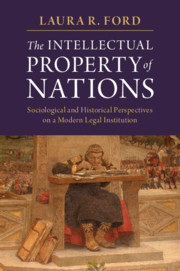 The Intellectual Property of Nations
The Intellectual Property of Nations Book contents
- The Intellectual Property of Nations
- The Intellectual Property of Nations
- Copyright page
- Contents
- Preface and Acknowledgments
- Introduction
- 1 Legal Institutions and Social Power
- 2 Legal Orders and Social Performance
- 3 Instruments of Legal Power in the Roman Republic
- 4 Semantic Legal Ordering
- 5 Cultural Transformations
- 6 Privileges and Immunities in a Sacramentalizing Order
- 7 Administrative Kingship and Covenantal Bonds
- 8 Intellectual Property in a Nationalizing Order
- 9 Cultural Transformations
- 10 Semantic Legal Ordering
- 11 Instruments of Legal Power in the American Republic
- 12 Legal Orders and Social Performance
- Conclusion The Intellectual Property of Nations
- Index
9 - Cultural Transformations
Naturalizing Intellectual Property
Published online by Cambridge University Press: 04 June 2021
- The Intellectual Property of Nations
- The Intellectual Property of Nations
- Copyright page
- Contents
- Preface and Acknowledgments
- Introduction
- 1 Legal Institutions and Social Power
- 2 Legal Orders and Social Performance
- 3 Instruments of Legal Power in the Roman Republic
- 4 Semantic Legal Ordering
- 5 Cultural Transformations
- 6 Privileges and Immunities in a Sacramentalizing Order
- 7 Administrative Kingship and Covenantal Bonds
- 8 Intellectual Property in a Nationalizing Order
- 9 Cultural Transformations
- 10 Semantic Legal Ordering
- 11 Instruments of Legal Power in the American Republic
- 12 Legal Orders and Social Performance
- Conclusion The Intellectual Property of Nations
- Index
Summary
In this chapter, I argue that the formation of intellectual property was enabled by a cultural transformation, involving the embrace of natural legality, a transformation that parallels, in significant respects, the Christianization of imperial Rome. In this cultural transformation, traditions of Roman law were rediscovered as a naturalistic foundation for sociability and national economic life. The commodification of human creativity and inventive discovery, through intellectual property rights, made sense, within the culture of natural legality, as a justified response to natural, but extraordinary, powers of human creativity, and became part of a broader strategy for national empowerment. The combination of Roman law with interpretations of Christian obligation that emphasized natural sociability and legality gave new form to a natural rights tradition, one that providing legitimating foundations for the recognition of intellectual property under principles of English common law. The chapter concludes with a focus on the U.S. constitutional convention of 1787, and the embrace of intellectual property as part of the constitutional framework for a powerful, national state.
Keywords
- Type
- Chapter
- Information
- The Intellectual Property of NationsSociological and Historical Perspectives on a Modern Legal Institution, pp. 270 - 302Publisher: Cambridge University PressPrint publication year: 2021
